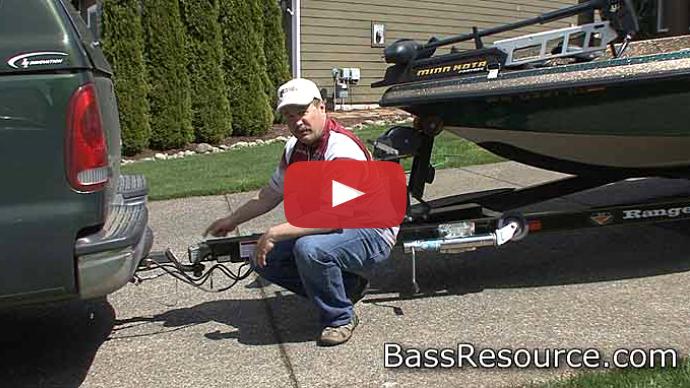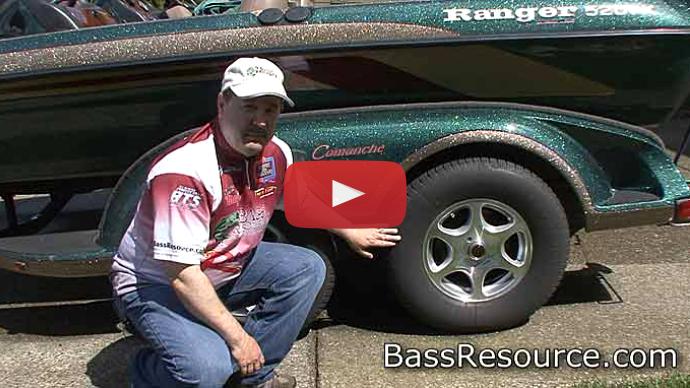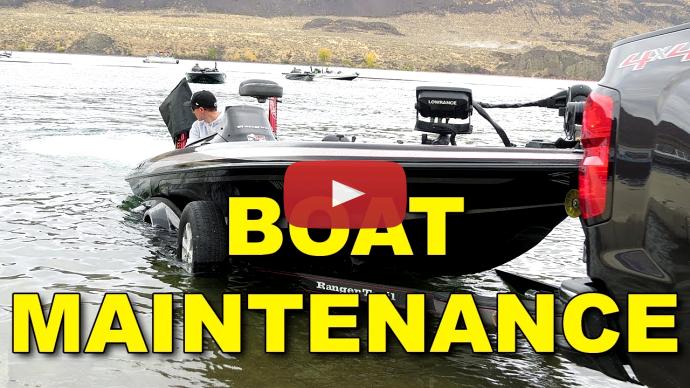Hey folks, Glenn May here with BassResource.com and I have a question for you. When was the last time you did any maintenance on the back of your boat? No, I'm not talking about your engine here, I'm talking about everything else. Now, if you don't know what I'm talking about listen up, this is for you. You see, there are a lot of things back here that require attention on regular basis and if you don't pay attention to them you're looking at some expensive repair bills or perhaps you may even have a dangerous situation on the water.
Let me explain. First of all, there's a lot of nuts and bolts on the back of the boat here and they tend to work themselves loose and it's not just from rough water conditions, being on windy water or just a lot boat traffic, it's not just from that, it's just or trailering up and down the road. You have potholes, you have construction that you go through, just rough road conditions, they're going to jostle the boat around quite a bit, oftentimes much more than what you get when you're on the water and nuts and bolts tend to back themselves out from all those vibrations.
So first off, we have Power Poles here and they're held on by a variety of nuts and bolts. I check these every couple months just make sure everything's good and tight. That's recommended by Power Pole by the way. So check them every two to three months just to make sure that everything's were supposed to be. Just a little crank here and there and you're good to go.
Another thing that you need to look at is over here. Look at all the bolts that attach back here at the motor. You've got bolts that attach to the transom and those will come loose. I kid you not. I've seen boats come in from rough water conditions and the engine hanging on by one bolt. Very dangerous situation and that happened just because the bolts, they had to have been loose to begin with and you get in some real rough water and things break, they rip themselves out. The last thing you want is an engine riding up the back of your boat into your lap and that can happen if everything breaks free. At the very least, it's a very expensive bill. So make sure that the bolts attaching everything to the transom are good and tight.
You also have bolts attaching the engine to the jack plate. Make sure that those are solid. Check them every once in a while. I do it about twice a year. I don't need to check it every single month, but check it twice a year, just to make sure everything's good, firm, and tight and were they're supposed to be. That's going to ensure that everything stays were supposed to be and it doesn't break on you.
In addition, over here, take a look. The trim mechanism right here, that has a couple things on it. First of all, there's a filler cap. This is a Yamaha unit. I don't know where the filler cap is on your unit, but take a look. There's a filler cap right here. Make sure that's nice and tight. That can come loose and it doesn't have to come all the way loose for you to have any leakage. You don't want to have fluid from the lake or the river get inside that because trust me, it doesn't work as well as hydraulic fluid. So make sure that cap is tight.
Also down here at the bottom, you'll note that there's couple bolts right here. There's one on each side. That holds the whole unit in place. Make sure these bolts are tight. They do work themselves loose, trust me, they do. I put in some Loctite just to make sure they don't come loose, because once they do, this tilt trim mechanism won't work anymore. When they come out, you can actually lose the whole unit. It's really scary. So make sure that that is good and tight.
Lastly, these tabs right here, where the engine hits the trim, these two little prongs that come out, put a little grease on them. Just a little marine grease is all it takes, just general-purpose marine grease, because what you've got is two different metals attaching to each other and they're rubbing against each other. When you have that, one's going to be harder than the other and one's going to give and wear out. So just a little dab of grease every month or so depending on how often fish is go save you a lot of repair bills down the road.
Anyway, I hope that works for you. I hope you like those tips. For more tips and tricks like that, visit BassResource.com.



